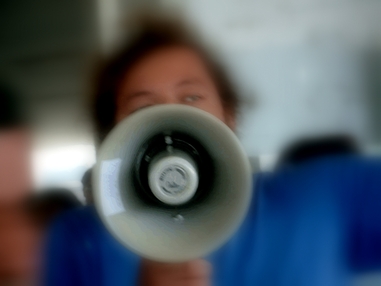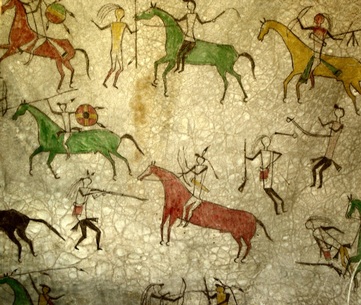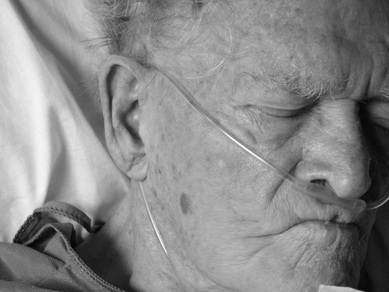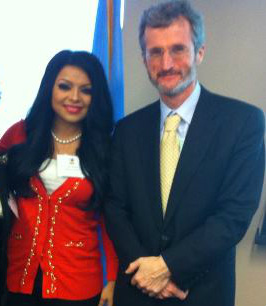| It was 6:15pm, December 28, 1978. United Airlines flight 173 was making its final approach to Portland International Airport. The passengers were strapped in, prepared for landing, some no doubt dreading the end of the holidays. But in the cockpit, all hell was breaking lose. Flight instruments indicated there was a problem with the landing gear. The domineering Captain McBroom decided to enter into a holding pattern until they could resolve the problem. He did this for almost an hour, while his co-pilot and engineer “politely gave hints” that the fuel supply was dangerously low. Flight 173 crashed six miles from the runway, killing 10 people, including the flight engineer. The cause of the crash was partially attributed to the flight crew’s “lack of assertiveness” for “not communicating their concerns adequately.” Most people confuse being assertive – feeling free to voice your beliefs and opinions in a respectful manner - with being aggressive. Women are especially stereotyped this way and consequently avoid being assertive for fear of being considered pushy. Assertiveness is effective communication. 3 Crucial Reasons for Assertiveness in the Workplace: 1. Safety - The most crucial reason for assertiveness in the workplace is to create a safe environment. This may same obvious, but often, even in life and death situations, people still DO NOT speak up. The above case may seem an extreme example, but assertiveness is vital in many workplace issues like sexual harassment, environmental hazards or manipulation by a domineering colleague. What if you worked late and felt uneasy about walking alone to your car? How many people would ask the security guard to accompany them? Sadly, rather than “bother” the security guard, most people would shrug off their uneasiness and walk into the dark car-park alone. 2. Fostering teamwork, collaboration & innovation – When employees are encouraged to be assertive – to voice their ideas and opinions freely - innovation is ignited, collaboration blossoms and morale increases. When the corporate culture is so that employees fear retribution over their safety or personal dignity, something is wrong. But employees have an equal responsibility to develop a character of assertiveness, so that regardless of the corporate culture they will be able to speak up. 3. Being client/stakeholder focused – The client is not always right and lacking the fortitude to challenge your clients/stakeholders at times can be very detrimental for them. Service professionals must, especially in these challenging times, be able to anticipate developments and act on them. Sometimes the clients/stakeholders may not agree, but overall a service professional with high integrity is much more valuable than a pushover. No one likes a “yes” man. | People Who Lack Assertiveness Experience:
People Who Are Assertive:
|
|
2 Comments
 In March 2013, I was invited to the 5th UN Women’s Empowerment Principles (WEPs) event in New York and I was thrilled. It was a phenomenal experience, listening to UN Secretary-General, Ban-Kimoon and other influential people from around the globe discuss how women were being empowered and strategize a future of equality and inclusion. They called for leadership to promote equality in the workplace; for parents to teach equality in the home; for males to champion the cause and for transparency, and reporting, on progress in the equality effort. Yet, the most profound moment of this elite gathering happened to me during a coffee break. That’s when I met Miriam from Egypt. A tall, forty-five-year-old brunette, she towered over me as we greeted each other in Arabic, kissing on both cheeks. Like long-lost friends, we chatted casually for a few moments. Then, I asked her when she would return to Egypt. “I fly back tomorrow. I can’t stay until the end of the conference because I’m marching in Tahir Square on the 8th,” she replied nonchalantly. I was momentarily speechless. Miriam was not some vague image screaming protests on TV. She was real. In fact, she was a successful businesswoman and yet she was determined to actively fight for women’s rights in Egypt. And she did not just fight from the safety of a conference room, but from the streets. Side-by-side, she would join women from all classes as they marched. I felt remarkably humbled by our encounter. As I walked back to my seat I considered our differences. Though women in Cayman do have more rights than Egyptian women, I wondered why it didn’t seem to disturb women here that they were still not getting their equal rights. Didn’t it bother them that their male counterparts were still being paid more than they were? It bothered me. And the echo of all those voices calling for equality now had a face – Miriam’s face. That chance meeting with the fiery Miriam inspired me to press on, advocating for women in Cayman in my own way. On my return to Cayman, I presented the WEPs to the management of the Cayman Islands Monetary Authority (CIMA), my employer, and they readily agreed to start openingly advocating for gender equality. Later that year in June, the experience of that NYC trip culminated in CIMA being the first statutory body to formalise its gender equality efforts with a massive training effort in the Gender Equality Law, 2011. But that was last year. This year, CIMA became more bullish about its gender equality efforts with the active commitment of top leadership by way of the Gender Equality Pledge. And what better organisation to lead this effort than one led by a woman. As the MD signed the Pledge with the Minister of Education, Employment and Gender Affairs, the Honourable Tara Rivers, I was flooded with gratitude to be part of such a momentous occasion. CIMA was making history. We hope that others will follow suit. CIMA pledged to promote gender equality in the workplace and equal opportunity in employment-related matters; prohibit discrimination against any person on the grounds of sex, marital status, pregnancy or any characteristic based on gender which applies or is attributed to a particular sex or marital status or pregnant state; and ensure a safe working environment for all, prohibiting sexual harassment in the workplace and taking immediate and appropriate actions to prevent such conduct. CIMA was already one of Cayman’s leading gender-equal organisations, upholding many of the UN’s Women’s Empowerment Principles. Boasting 65 percent female employees, CIMA also has existing initiatives in place to support work-life balance and the full participation of women, proactively appointing female employees to management roles. Still, we wanted to be even more active in the initiative. In recognition of International Women’s Day 2014 and Honouring Women Month, CIMA also hosted a staff lunch and a screening of the award-winning documentary, Killing Us Softly 4, to increase awareness about gender discrimination in advertising. But it doesn’t stop there. CIMA is also striving to introduce a mandatory, online training programme on gender discrimination and sexual harassment in the workplace for new employees. And Miriam? As International Women’s Day (8 March) approached, I thought about her. I imagined her shouting and marching boldly through the crowded streets of Egypt, demanding her God-given right to be treated fairly. Little did she know that on a tiny island on the other side of the world, her unwavering dedication had now become part of my story as well. Abundance is not what you have. It’s what you DO with what you have.” ~ Lady Rabia Nine years ago, I framed a quote by Mary Oliver for my children. It read, “What is it that you plan to do with your one wild, precious life?”
I wanted to remind them that they were cherished, that they should always accept responsibility for their experience and that they should contribute to the betterment of humanity. Oddly enough, that framed quote was one of the few things they grabbed when we were escaping Jordan. On January 19, 2011, after a rousing reception on our arrival in the Cayman Islands, I happened to look into my daughter’s backpack. And there it was, this little pink frame, shoved haphazardly between two pieces of clothes. Today, it still sits on their dresser, a testament to our triumph and a constant reminder to make their lives meaningful. Living an abundant life is not accidental. It’s a choice. Though you may lack financial abundance, the relationships you want or a top career, you can decide to make your life count and commit to changing your life. The person who chooses to act regardless of their circumstance, with a conviction to succeed, must be exceptionally resourceful, resilient and of high self-esteem. I believe true abundance is holding yourself accountable for your experiences and regardless of the circumstances, or adversity, you can overcome. So, what is it that YOU plan to do with your one wild, precious life? Above all things, be courageous.  Do you know that the way you think and explain the events in your life affects your emotional wellbeing, your physiology, your behaviour and ultimately your outcomes? Yes, those horrible, silent movies you play over and over in your head are bad for you. Most of us have been conditioned to think negatively from childhood with constant reminders like, “don’t get your hopes up”. Adults often tell children this to prevent disappointment. We, in turn, carry this mentally into adulthood, using pessimistic explanations for events I refer to as “stuff that happens”. Event: A horrible break-up. Your explanation: All men are dogs...maybe he would have been more attracted to me if I were slimmer...I will never find anyone...I should have listened to my mother. Seeing the darker side of things is not always bad - it allows you to feel less stressed. But this thought process prepares you for failure, it erodes your hope and it is totally disempowering. So, how do those happy-go-lucky people think? Optimistic people tend to explain adversity and challenges as “local – just this issue” and “temporary - it won’t last forever.” Pessimists explain adversity and challenges as “global – it’s everywhere” and “permanent – it’s going to always be like this.” What “spin” do you put on things? And how can you stop? Before you can stop the negative story’s you weave, you have to be more mindful of your thoughts and how you explain the “stuff that happens”. During my ordeal to recover my children from the Kingdom of Jordan, I became very mindful of how my thoughts empowered me. I had travelled alone to Jordan with only a small amount of money. I didn’t know anyone and I didn’t have a job. But I summoned up my courage and decided that I was going to do whatever it took to get my children back. Once, when a Jordanian man learned why I had come to Jordan, his eyes widened and his jaw dropped with shock. “You are stupid!” he said. “Pardon me?” I snapped. “You are stupid to come here with no money, no job and no family to protect you”. I smiled then. “I never thought of it that way,” I replied. “I just thought I was being courageous.” My version of my story was much more empowering than wallowing in self pity, contemplating the dire circumstances of my reality. In my story, I played the spirited protagonist; the feisty, little underdog, who was hell-bent on recovering her children. Many days, I was hungry, lonely and deathly cold, but my account inspired me to remain vigilant. My version of that harrowing ordeal was one that always ended in triumph. It gave me hope and allowed me to constantly renew my conviction. What’s your story? How do you explain the “stuff that happens” in your life? Remember this is YOUR STORY, so you, alone, should determine how it will unfold. Be the hero of your story and make your life epic.  My grandparents were married for 55 years. Growing up, I rarely saw any public displays of affection between them. Yet, their love for each other was indisputable. No, I never heard them call each other “darling,” “honey” or “sweetheart.” In fact, they endearingly referred to each other as “ole fool.” But they were from a different time — a time when girls married their first love and boys asked permission to court their sweetheart. So, I imagine that to them such terms were much too intimate for my young ears. The first intimate thing I witnessed between them was when I was 21. I had flown back home from university because my grandfather had had a stroke, and I rushed into his hospital room to find my grandmother holding his hand. I was momentarily stunned and embarrassed. But I was also overwhelmed by the love and sadness on my grandmother’s face. Can you hold five decades of love, marriage, births of children, the death of a child, and hopes, and dreams and disappointments? It seemed like she was holding it then in that cold hospital room, ever so tenderly in the warm joining of their palms. My grandmother always confessed that her marriage was not perfect. None is. But both she and my grandfather were immensely proud that they had held on — for a lifetime. And she continued to hold on as his circle of life slowly closed. She held on through feedings, sponge baths, and emergency hospital visits. For the next few years she held on to him, sharing his room, talking to him and arguing with him like nothing had changed. But as she sat at his bedside, holding his hand, I could imagine her inner turmoil of wanting him to stay with her, but hating to see him suffer. My grandfather, now a pale figure in a hospital bed, shared this turmoil. Formerly a strong man with sunbaked skin, he was tired of being helpless and longed for release. But his utmost concern was her well-being — the woman that had been his bride at 17. He had first asked permission to sit with this girl in her mother’s tiny sitting room and similarly sought permission to leave her. The last thing my grandfather did before he died was to ask his wife, his lifetime partner of over five decades, if he could go. Gasping for air, he asked her if she would be OK. Still holding his hand, she sobbed and nodded yes. Then, she rubbed the gray sprigs of hair on his balding head and with all her love, everlasting love ... she let him go. |
AuthorLady Rabia Abdul-Hakim is a mu;ti-genre author, international speaker, Communications & Branding Strategist for Go Women Global and a Champion of the UN's Women's Empowerment Principles . She is also the Founder & CEO of ContessaBlack Entertainment and the former Co-founder of BIG Cause (Arabia), a cause marketing communications agency in the Kingdom of Saudi Arabia. ArchivesCategories
All
|

 RSS Feed
RSS Feed
